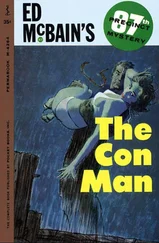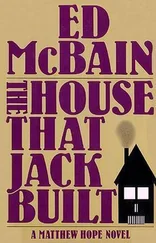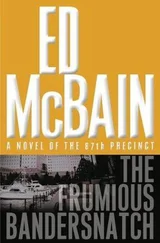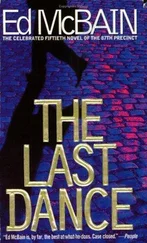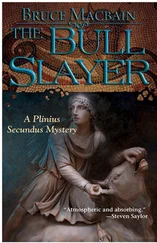Ed Mcbain - The Heckler
Здесь есть возможность читать онлайн «Ed Mcbain - The Heckler» весь текст электронной книги совершенно бесплатно (целиком полную версию без сокращений). В некоторых случаях можно слушать аудио, скачать через торрент в формате fb2 и присутствует краткое содержание. Жанр: Полицейский детектив, на английском языке. Описание произведения, (предисловие) а так же отзывы посетителей доступны на портале библиотеки ЛибКат.
- Название:The Heckler
- Автор:
- Жанр:
- Год:неизвестен
- ISBN:нет данных
- Рейтинг книги:4 / 5. Голосов: 1
-
Избранное:Добавить в избранное
- Отзывы:
-
Ваша оценка:
- 80
- 1
- 2
- 3
- 4
- 5
The Heckler: краткое содержание, описание и аннотация
Предлагаем к чтению аннотацию, описание, краткое содержание или предисловие (зависит от того, что написал сам автор книги «The Heckler»). Если вы не нашли необходимую информацию о книге — напишите в комментариях, мы постараемся отыскать её.
The Heckler — читать онлайн бесплатно полную книгу (весь текст) целиком
Ниже представлен текст книги, разбитый по страницам. Система сохранения места последней прочитанной страницы, позволяет с удобством читать онлайн бесплатно книгу «The Heckler», без необходимости каждый раз заново искать на чём Вы остановились. Поставьте закладку, и сможете в любой момент перейти на страницу, на которой закончили чтение.
Интервал:
Закладка:
He had, in fact, if a summary glance at the wounds in his chest meant anything, been killed by a shotgun at fairly close range. He lay on his back under the trees and a small knot of experts in death surrounded the body and made faces indicative of disgust and empathy and boredom and indifference, but mostly of pain. Steve Carella was one of the policemen who looked down at the body of the naked man. Carella’s eyes were squinted almost shut even though there was no sunshine under the canopy of the trees. There was a sour look on Carella’s face, a look of disapproval and anger laced with discomfort. He looked at the man and he thought Nobody should die in April, and he noted automatically the shotgun wounds on the man’s chest and, just as automatically, he noticed that there was a single large entrance wound and several zones of small satellite perforations produced by pellets which scattered from the main charge. The large entrance wound told him that the gun had been fired anywhere from one to three yards away from the victim. Up to a yard’s distance, the shotgun would have produced a wound with a lot of tattooing, burning, and blackening. And beyond three yards, the shot would have dispersed, and formed constellationlike patterns on the victim’s skin. Knowing this, and not knowing much more than this at the moment, Carella’s mind made the associations unconsciously and unemotionally while another part of him looked down at this person who had once been a man and who was now a ludicrously naked, loosely jointed pile of fleshy, angular rubbish—no longer a man; simply something soft and spongy, but not a man. Life had been robbed from this mass of flesh, and now there was nothing but death housed in the skin case. Carella wiped a hand across his mouth even though he was not sweating.
It was cool in the copse of trees where the policemen worked. Flashbulbs popped around the dead man. A powdered chalk line was sprayed onto the ground, outlining the body. The laboratory technicians searched the bushes for footprints. The men stood about in uneasy clusters, discussing the world’s heavyweight champion fight, the pennant race, the nice weather they’d had this past week, anything but death which stared up at them from the ground. And then they finished their work, all the work they could do for the time being. They hoisted the corpse onto a stretcher and carried it to the path, and then out of the park and over to the curb where an ambulance was waiting. They slid the corpse into the back of the meat wagon, and took it to General Hospital where the autopsy would be performed. Carella thought for a moment about the stainless-steel autopsy table which was laced with troughs like a carving board’s troughs to catch the blood—the table slightly tilted—and channel it toward the basin at the far end, he thought of that goddam unemotionally sterile stainless-steel table, and he thought of scalpels and he tightened his fists in anger and again he thought Nobody should die in April, and he walked out to the police sedan parked at the curb and drove back to the precinct house. He could not find a parking space closer than two blocks away. He parked the car on Grover Avenue and walked back to the building facing the park.
Somehow the mottled stone front of the ancient building seemed to blend with April. The gray assumed a softer tone when juxtaposed to the vibrant blue sky beyond it. The hanging green globes captured something of the blue, and the white numerals “87” on each globe picked up a touch of the clouds that hung fat and lazy in the early spring sky. The similarity ended the moment Carella climbed the low flat steps of the front stoop and passed into the muster room. High-ceilinged, bare except for the muster desk and Sergeant Dave Murchison who sat behind it, the room resembled nothing more than the cheerless, featureless face of an iceberg. Carella nodded to the sergeant and followed the pointing white wooden hand which told him—in case he didn’t know after all these years—where to find theDETECTIVE DIVISION . Where to find it was upstairs. He mounted the iron-runged steps, noticing for the first time what a clatter his shoes made against the metal, turned left into the upstairs corridor, passed the two benches flanking the hallway, and was passing the men’s lavatory when he almost collided with Miscolo who came out of the room zipping up his fly.
“Hey, you’re just the man I want to see,” Miscolo said.
“Uh-oh,” Carella answered.
“Come on, come on, stop making faces. Come into the office a minute, will you?”
The office he referred to was the Clerical Office, labeled with a hand-lettered sign in the corridor, a cubbyhole just outside the slatted, wooden railing which divided the corridor from the detective squadroom. Alf Miscolo was in charge of the Clerical Office, and he ran it with all the hard-fisted, clear-headed mercilessness of an Arabian stablekeeper. His horses, unfortunately, were usually a handful of patrolmen who had pulled twenty-fours, duty as records clerks. But if Miscolo had been given, let us say, a hundred men with whom to run his clerical office, all crime in that fair city would have been eliminated in the space of two days. In conjuction with the police laboratory downtown on High Street, and the Bureau of Criminal Identification, Miscolo’s dossier on criminals would have made it absolutely impossible to commit a crime without risking immediate capture and incarceration. Or so Miscolo fantasied.
The Clerical Office, at the moment, was empty. Its green filing cabinets lined the right-hand wall of the room, facing the two desks opposite it. At the far end of the room, a single huge window, covered on the outside with wire mesh and the grime of a decade, was opened to the fragrance of April.
“What a day, hah?” Miscolo said. He wagged his head in appreciation.
“All right, what’s on your mind?” Carella said.
“Two things.”
“Shoot.”
“First, May Reardon.”
“What about her?”
“Well, you know, Stevie, Mike Reardon worked here for a long time before he got killed. And I liked Mike. I mean, everybody did. You did, too.”
“I did,” Carella admitted.
“And he left May and two kids. That ain’t no picnic, Stevie. So she makes the precinct beds, but what the hell does that give her? Enough to feed two kids? Stevie, this is a tough pull. You got a wife, you got kids. God forbid, suppose something should happen to you, you want Teddy living on what precinct beds get her? Do you?”
“No,” Carella said. “What do you want?”
“I thought we could all chip in. The guys on the squad, and the patrolmen, too. Just a little something more each week to boost that bed money. What do you say, Stevie?”
“Count me in.”
“Will you talk to the other bulls?”
“Now, listen—”
“I’ll talk to the patrolmen. What do you say?”
“I’m a lousy salesman, Miscolo.”
“Aw, this ain’t like selling nothing, Stevie. This is giving that little girl a break. Did you ever see that little girl, Stevie? She’s so goddam Irish, you want to cry.”
“Why?”
“I don’t know. Irish girls make me want to cry.” He shrugged. He was not a handsome man. His nose was massive, and his eyebrows were bushy, and there was a thickness about his neck which created the impression of head sitting directly on shoulders. He was not a handsome man. And yet, in that moment, as he said what he had to say about Irish girls, as he shrugged boyishly afterwards, there was an enormous appeal to the man. He realized in an instant that Carella was staring at him, and he turned away in embarrassment and said, “What the hell do I know why? Maybe the first girl I laid was Irish—how do I know?”
“Maybe,” Carella said.
Читать дальшеИнтервал:
Закладка:
Похожие книги на «The Heckler»
Представляем Вашему вниманию похожие книги на «The Heckler» списком для выбора. Мы отобрали схожую по названию и смыслу литературу в надежде предоставить читателям больше вариантов отыскать новые, интересные, ещё непрочитанные произведения.
Обсуждение, отзывы о книге «The Heckler» и просто собственные мнения читателей. Оставьте ваши комментарии, напишите, что Вы думаете о произведении, его смысле или главных героях. Укажите что конкретно понравилось, а что нет, и почему Вы так считаете.



